Pastor’s Word
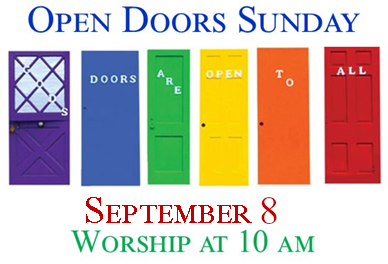
Come home!
by Rev. Dr. Dale Azevedo, Sr. Minister
“Come home, come home.
You who are weary, come home.”
Will L. Thompson
Come Home
September 8 is Open Doors Sunday. As many of you know, that is the official kickoff of our 2024-2025 program year. It comes at a time that our kids have gone back to school, our boaters lament the passing of summer, and our staff and lay leaders get busy. It is a really fun day in the life of the church, and recently we’ve celebrated that day with a fun, full worship service followed by a cookout and party after church.
I want to invite you to join us for this special Sunday and come back home to church. We have so much planned for you. In worship we have the dedication of our volunteers for children’s ministries, a baptism of the cutest little boy since the last one, a great sermon by Racquel, and a special musical guest. And if that isn’t enough, afterward we’ll have hot dogs, an ice cream truck, activities for the kids, and fellowship.
But not only that, we have so much planned for this fall that you will definitely want to be a part of!
Your sermons
This summer Racquel and I preached a season of grab-bag sermons! We didn’t know what our sermon topic would be until we pulled your suggestions out of a bag. And it was wild! However, there were dozens of sermon suggestions we didn’t get to. And they were great! So, Racquel and I decided to use those suggestions to populate our sermon schedule for this fall. The best part is we get to plan ahead, this time! So this fall we will be preaching your special requests from the summer with topics like:
What is prayer and what does it accomplish?
With so many religions, who is the real God?
What are heaven and hell really like?
How do we coexist with those we disagree with?
Did God stop talking?
The challenge of forgiveness.
It’s likely we’ll publish the list along with anticipated dates later so you won’t miss the sermons that really peek your interest. So, come home and listen to your sermons!
Your family
Whether you 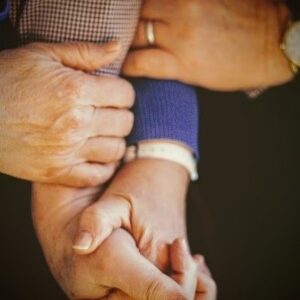 attend by yourself, with friends, or with your kids/parents, your family will be at church! Who is your family? Everyone who attends! We talk about church being a family more than a group of friends for a variety of reasons. First, you don’t get to choose your family and you don’t get to choose who comes to church. Like our families of origin, we don’t control who comes through the doors, yet we hold many shared experiences in common. Also like your family, there are probably those you get along with a whole lot better than others! (Aint that the truth!)
attend by yourself, with friends, or with your kids/parents, your family will be at church! Who is your family? Everyone who attends! We talk about church being a family more than a group of friends for a variety of reasons. First, you don’t get to choose your family and you don’t get to choose who comes to church. Like our families of origin, we don’t control who comes through the doors, yet we hold many shared experiences in common. Also like your family, there are probably those you get along with a whole lot better than others! (Aint that the truth!)
However, also like family we are here for you when you need us most. We may not agree on everything and we may upset one another at times, but we are called to truly care for one another, to love one another. Where else can you find that? Where do you find it in your life? We pray together. We live together. We laugh together. We cry together. We grow together. That is family, and you are welcome here! Come home and see your family!
Your faith
One of the most common statements I’ve heard from congregation members over the past few years is, “I have nowhere else in my life where I can talk about my faith like this. I can’t talk with my spouse, my friends, and certainly not my coworkers. This is the only place I can discuss what really matters to me.” Whether it is in worship, or Bible study, or a fellowship group, church is one of the VERY few places in our lives where people feel they can discuss God and ask their questions freely. What a gift that is! Do you have questions about the meaning of life, God, what happens after we die, or even what it is you believe? Then this place is for you. Come home and explore your faith!
feel they can discuss God and ask their questions freely. What a gift that is! Do you have questions about the meaning of life, God, what happens after we die, or even what it is you believe? Then this place is for you. Come home and explore your faith!
Your ministry
How do you live out your faith? What do you do in your life that God would look upon and say, “Well done, my good and faithful servant?” There are so many ministry opportunities here at your church. Just go to our web page and explore our Ministries tab or take a look at our list of current ministry teams. There are so many to choose from. And what’s even better is if you don’t see one that interests you there, you can always start a new one. Our vision for ministry at BCCUCC is that every member, no matter how old or young, skilled or unskilled, faithful or doubting, should have a place to be in ministry. Church isn’t just a place to come and learn and find connection, it’s also a place to make a difference. Come home and get involved in your ministry!
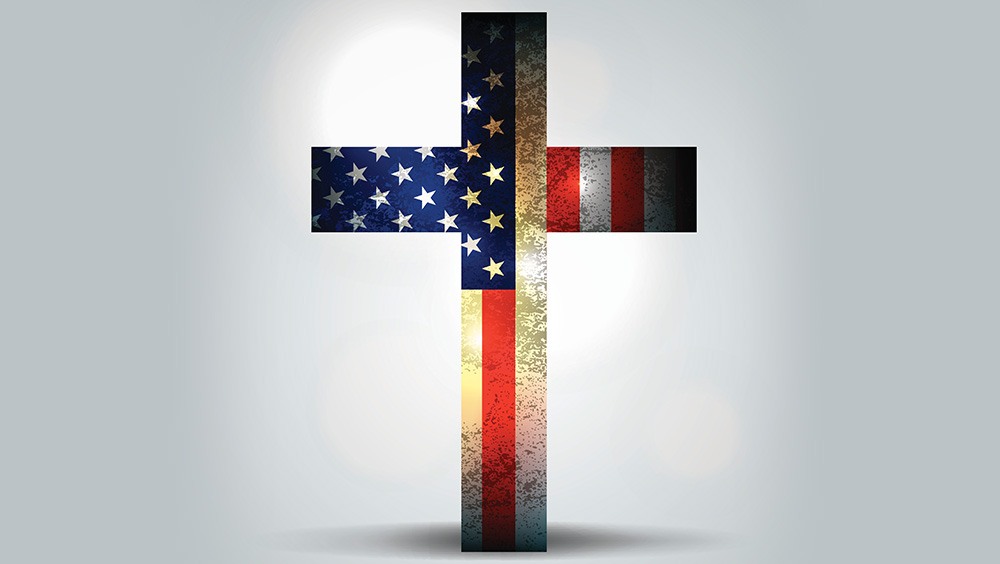
What is Christian Nationalism and why does it matter?
by Rev. Dr. Dale Azevedo, Sr. Minister
A few weeks ago, during our first grab-bag sermon, I referred to Christian Nationalists adding the commentary that their ideals aren’t particularly Christian or patriotic. This was my sermon on kindness and humility where I discussed the “fruits of the Spirit” (June 23) as the Biblical test of true faithfulness. Following that sermon, one of our members approached me and asked if I could clarify what I meant by Christian Nationalism and who might fall into that category. I happily agreed to do so. However, as I began to put my thoughts together, I realized that it might make for a relevant blog instead of a one off response to an individual’s question. So here goes:
What is Christian Nationalism and why does it matter?
To understand Christian Nationalism, we must first understand nationalism and what is meant by the term. Nationalism is not patriotism.1 Patriotism is a love of one’s country and a celebration of all this is good about it. Nationalism, instead, is a belief that people can be easily categorized by one’s nation of origin and that one’s personal identity is defined by the general characteristics and moral code of that nation. For example, an American can be easily defined by a core set of values present in the larger culture and that they are distinctly different from an Iranian, a Pole, or a Brazilian. Often accompanied with this understanding is a belief that one’s own nationalism is inherently better than another’s and that it must be protected or it, along with its advantages, will be lost.2 We have witnessed a rise in nationalism in politics throughout the world in recent years.
So, what is Christian Nationalism?
Christian nationalism is a particular brand of nationalism that sees Christian faith as the primary characteristic that defines American identity. It states that American morals and culture are defined by our Christian roots and that those morals and values must be protected or America, as it has been, will cease to exist. Christian nationalism is one of the forces at the forefront of what many are calling our current culture war, and it has been becoming increasingly mainstream in American politics.
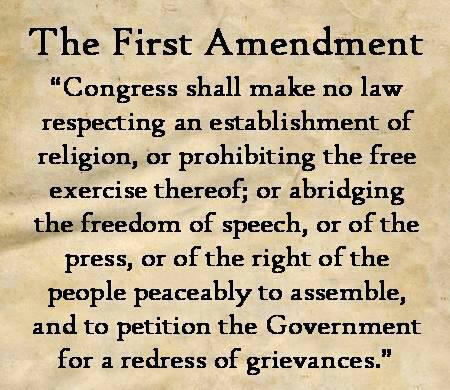
Why is it a problem?
Many would argue that our politics and social views ought to be informed by our religious faith. I would be one of these. Our faith should influence who we vote for, what laws we support, and what values we hold dear. If it doesn’t, then what purpose does our faith have? However, Christian nationalism isn’t just about encouraging people to vote according to their beliefs. It is about using the political system to enshrine one set of religious beliefs as law for all. It is about diluting or ending the separation of church and state by using the government’s power to give primacy to one interpretation of faith over any other.3 This is a threat to all Americans (Christian and non-Christian) whose views do not directly align with those in power.
How is it becoming mainstream?
In the past, Christian Nationalism has been characterized by those living on the extremes: white nationalists, white supremacists, and others often characterized as hate groups. However, over the past year we have seen an increasing number of examples of Christian nationalism in mainstream politics.

Louisiana: In June, Gov. Jeff Landry signed a bill that required state’s public schools, colleges, and universities to display a poster of the Ten Commandments in every classroom. The Ten Commandments have long been a lightning rod for political discourse. Many argue that they are the basis of our legal system and ought to be seen as a public document rather than a religious one. However, we cannot divorce the religious aspects of the Ten Commandments from the legal. They are, and always have been, a religious document. And as such, we have to ask ourselves which version of the Ten Commandments will be displayed and who will describe them to the students when questions are raised? Roman Catholics, Protestants, and Jews all have different versions of the Ten Commandments. We number them differently. We write them in different languages. And we interpret them very differently. Who determines which version is the legal version and which interpretation is allowed (and which is not!). This seems like a thinly veiled attempt to have the state give privilege to one faith, and one interpretation of that faith, over all others.
Oklahoma: Later in June, the state of Oklahoma went even farther than Louisiana when state school superintendent mandated Biblical education in all public schools for grades 5-12. This is both a violation of the authority granted to local school districts in Oklahoma to determine their own curriculum as well as a direct violation of the First Amendment of the Constitution which forbids government establishment of any religion. Again, it raises the great question of whose Biblical interpretation will be taught in the public schools? And can the Bible be taught as myth or folklore, or will it be taught as truth? And if so, who’s truth? This mandate is a clear example of Christian nationalism as it is intended to indoctrinate the children of Oklahoma into one state-sponsored faith and value system, even rejecting the diversity present in modern Christianity.
US House of Representatives: The US House of Representatives has always been characterized as the more rambunctious house of legislation and often had its share of political radicals.  Currently we have members such as Alexandria Ocasio-Cortez and Ilhan Omar as well as Marjory Taylor Green and Matt Gaetz sharing more extreme positions on the left and right respectively. This is nothing new. However, Mike Johnson, who is the current Speaker of the House, ideally a more moderate and powerful position, has openly embraced Christian nationalistic ideals. While he has refrained from calling himself a Christian nationalist, as other congress members have recently done,4 his talking points are not far from theirs. In a 2016 interview he was quoted as saying, “Over the last 60 or 70 years our generation has been convinced that there is a separation of church and state . . . most people think that is part of the Constitution, but it’s not.” And more recently, “The founders wanted to protect the church from an encroaching state, not the other way around.”5 All of this is intended to erode the long held American ideal of the separation of Church in state in favor of establishing one set of beliefs, a conservative Christian one, as the de facto rule of law in the U.S.
Currently we have members such as Alexandria Ocasio-Cortez and Ilhan Omar as well as Marjory Taylor Green and Matt Gaetz sharing more extreme positions on the left and right respectively. This is nothing new. However, Mike Johnson, who is the current Speaker of the House, ideally a more moderate and powerful position, has openly embraced Christian nationalistic ideals. While he has refrained from calling himself a Christian nationalist, as other congress members have recently done,4 his talking points are not far from theirs. In a 2016 interview he was quoted as saying, “Over the last 60 or 70 years our generation has been convinced that there is a separation of church and state . . . most people think that is part of the Constitution, but it’s not.” And more recently, “The founders wanted to protect the church from an encroaching state, not the other way around.”5 All of this is intended to erode the long held American ideal of the separation of Church in state in favor of establishing one set of beliefs, a conservative Christian one, as the de facto rule of law in the U.S.
The Barrington Times: Finally, a very local example – many of you are undoubtedly aware of the organized campaign against our town’s appointed DEI commission. It made weekly appearances throughout the winter and spring in the opinion section of the Barrington Times with letters to the editor listed under the names of various townspeople. Of all their letters attacking these appointed volunteers, one letter is most relevant for our conversation here. It was entitled “DEI’s Godless Agenda” and was published in early weeks of May.6 What I find most disturbing about this hurtful letter is that many of the members of the DEI commission are either clergy or active laypeople in our local churches and synagogue. The author(s) knew this, and still chose to attack them as “godless” as a part of their political attacks. Again, this carries the strong undertones of Christian nationalism, suggesting only one interpretation of faith is “godly” and acceptable in our national discourse.
America Was Founded on Religious Pluralism.
Reading through our national history, there is no doubt that the United States has roots deeply embedded in Christianity. Our own forebearers, the founders of our church, were decedents of the Puritans, the settlers who came over on the Mayflower and founded the Massachusetts Bay Colony. In the subsequent decades, colonists settled throughout the eastern seaboard, also bringing with them their Christian faith. The influence of these early Christian settlers on our national identity and values is undeniable. However, there was not just one understanding of Christianity in the colonies. There were different and conflicting ideas of faith between each of the colonies and each of  the cultural groups that came to the continent. And many of them came here to escape government sponsored religious persecution in their home country. That is why the founders of this country were so clear in providing for religious freedoms in our national and constitutional framework. Their Christian expressions were just as diverse as ours are today.
the cultural groups that came to the continent. And many of them came here to escape government sponsored religious persecution in their home country. That is why the founders of this country were so clear in providing for religious freedoms in our national and constitutional framework. Their Christian expressions were just as diverse as ours are today.
This early understanding of religious tolerance (on a national level, not always on a local level) opened the doors for people of other faiths to come to our nation and became part of the reason it is so great today. Christian nationalism seeks to rewrite this part of American history. It seeks to recast the nation we know and love, one that has experienced religious diversity from its earliest days, as a nation of one dominant faith, espousing one set of values, and relegating all else as un-American. This reality threatens not only our neighbors of other faiths or no faith, but it threatens us, faithful Christians who may interpret our beliefs differently than those in power. As Christians, as Americans, we must fight against this trend.
Where can I learn more?
You can see the many footnotes that I included in my blog. I encourage you to read further on this issue. One of the things I found most encouraging as I wrote this blog was the number of evangelical (i.e. often more conservative or traditional) Christians who wrote about the dangers of Christian nationalism. These are not just the concerns of progressive Christians. It is a concern for all Americans who wish to practice their faith without the intrusion of governmental opposition.
Here are some of the sources I found most interesting:
-
- “What Is Christian Nationalism?” by Paul D. Miller, Christianity Today, February 3, 2021
- “What Is Christian Nationalism, Exactly?” by David French, New York Times, Feb. 25, 2024
- “Christian Nationalism Explained: An Interview with Rutgers Professor Joseph Williams” by John Chadwick, rutgers.edu, Mar. 4, 2021
- “Christian Nationalism Doesn’t Just Threaten Our Nation – It Threatens Our Faith” Compassionate Conservative Revival
- “The Truth About Christian Nationalism” Evangelicals for Democracy
I hope you found this blog interesting and informative.
Blessings to you,
Dale
- “What Is Christian Nationalism?” by Paul D. Miller, Christianity Today, February 3, 2021
- “What Is Christian Nationalism, Exactly?” by David French, New York Times, Opinion, Feb. 25, 2024
- “Christian Nationalism Explained: An Interview with Rutgers Professor Joseph Williams” by John Chadwick, rutgers.edu, Mar. 4, 2021
- “Josh Hawley Doubles Down on Christian Nationalism Remarks” by Khaleda Rahman, Newsweek, Jul. 10, 2024 and “Americans are getting more accepting of Christian nationalism” by A. Shortle et. al. The Washington Post, Sept. 1, 2022
- “The Christian Nationalism of Speaker Mike Johnson” by A. Whitehead and S. Perry, TIME, October 27, 2023
- I recently tried to find the direct link to this letter on the Barrington Times website. Unfortunately, that letter no longer appears to be in their archive. I was only able to find follow-up letters which referenced the original letter by name. The original letter likely appeared in the May 3rd or May 10th edition of the Barrington Times.
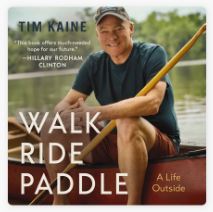
Go Outside
by Rev. Racquel Ray,
Associate Minister of Congregational Life
Christianity is an embodied faith. Beginning with the Incarnation of Jesus, humans are called to relationship with God in body, mind, and spirit. Paul’s letters speak much about the flesh; our temptations, our faults, and our shortcomings. But, even with the limitations of the human condition, we are still called and enabled to embody our faith. Sometimes, our church voices are mind and spirit centric and overlook the embodied elements of our spiritual practice.
This summer, I’m reading Sen. Tim Kaine’s book, Walk, Ride, Paddle: A Life Outside. I’m enjoying Tim’s descriptions of the Virginia landscape through the Appalachian Trail, State Parks, National Parks, roadways, and waterways. He recreates the visceral impact of the land and water through narratives of temperature, precipitation, flora, fauna, and geology. The story follows Tim’s journey of a three-year exploration of his state as he hikes, bikes, and kayaks the natural resources.
I am reminded of my desire to ‘be a tourist in my hometown’. In years past, it was my praxis to ‘tour’ the town in which I lived. I would visit historical societies, museums, and walk or ride by the historic ‘plaque’ houses. When our family lived in Idaho, we spent every other weekend camping in either a State Park or a National Park. We would attend the Ranger Talks and participate in any park exploration activities. Our kids were Junior Rangers.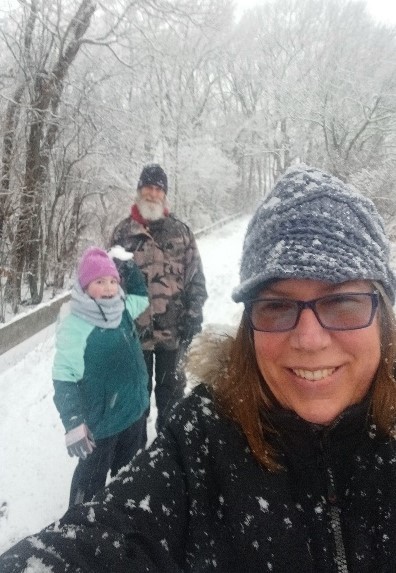
With the exception of Roger Williams Park in Providence and Blackstone River Valley my National Park Pass has been collecting dust for about seventeen years. We’ve visited the New Bedford Whaling Museum and the Friendship in Salem. But, we have not been able to explore as much of New England as we did of Idaho. Regrettably.
Reading Tim’s book brought me back to the joy of being outside – and NOT working on a project. We spend a lot of time outside in the gardens and yard which helps to feed our family. We need to reconnect with being outside for fun, pleasure, relaxation, and connection – and Spiritual wellness.
Christianity is an embodied faith. So, reconnecting our physical bodies with the natural world is also a spiritual practice. Cohabitating with all of creation as creatures of the Creator brings us to a calm, centered, groundedness, and connection that only comes from the natural environment.
Our family has only recently discovered the Sowams Woods Trail in Barrington. After living here for over seventeen years, we decided to explore our neighborhood and discovered this natural gem. Halfway through the trail we came across a metal sculpture with a sign and a QR code. We found our first RI Walks Creature and that led us to the RI Walks Creature Challenge https://www.riwalks.org/challenge.php where we found resources to explore other RI nature trails in a fun and interactive way.  The RI Walks website says, “Hidden along 34 trails are unique steel-creature sculptures inspired by nature. These creatures can be difficult to find, but when you see one, you’ll know that you’ve found a very special place! Each creature has a QR code for you to scan and track your progress, and when you have found all 34 you will be a challenge winner and win some great prizes!” That’s for me!
The RI Walks website says, “Hidden along 34 trails are unique steel-creature sculptures inspired by nature. These creatures can be difficult to find, but when you see one, you’ll know that you’ve found a very special place! Each creature has a QR code for you to scan and track your progress, and when you have found all 34 you will be a challenge winner and win some great prizes!” That’s for me!
Among all of the wonderful and delicious summer activities that are culturally outside in Rhode Island, I’m partial to the beach, clam boils, Riverside Creamery (small vegan coffee sugar cone with jimmies), the pool, gardening, back yard cookouts, at home fireworks show, catching fireflies, and hanging laundry outside to dry. This year, I’m going to add finding some creatures along the 34 RI Walks.

What is your spiritual practice outside going to be? What appeals to you and your connection to creation? How will you Go Outside? (And if it’s a lobster bake on the beach please let me know!)

Grab-bag Summer Sermon Series
by Rev. Dr. Dale Azevedo, Sr. Minister
It should be no surprise to those of you who have been around for a while that Racquel and I like to share a sermon series over the summer. Two years ago we had the summer of Elijah (wohoo!) and last year we had Women of the Bible. So, I bet you have been waiting with bated breath on the announcement of what series we will do this summer…
Well, Racquel and I are going out on a limb. We are going to hold a grab-bag summer sermon series!
“What is a grab-bag summer sermon series?” you ask. It’s a lot like it sounds. Everyone is invited to bring a sermon topic with them, place it in a bag with all the others, and then Racquel or I will draw from the bag and preach on whatever theme we draw out. We will do this new each week. So if you bring a suggestion week 1 you will need to bring it again in future weeks. There is no sense in us preaching on your topic on a week you aren’t there!
So as we prepare to begin this experiment on Sunday, here are a few questions you may be asking:
Are you serious?
Yes. In fact, it sounds fun. Or rather, I should say, it sounded fun when Racquel and I decided to do it. Now, it’s actually a bit nerve-racking. But I have learned a few things over my years of ministry. One is this, that pastors can get stuck in a rut. Pastors can get in a preaching groove where they unknowingly start repeating the same sermons or sermon ideas over and over. We do it in new ways, but it can often be the same (or similar) message. It can get stale for the listeners. Another thing I’ve learned is that congregation members have great ideas for sermons. You know what’s on your mind, what questions you have, what you’ve been struggling with or excited about recently. And yet, the preacher may never preach the sermon you want to hear. That’s because we may not know it’s on your mind. This series gives you the chance to request the sermon you want to hear, and we’ll do our best to preach you through it!
do it. Now, it’s actually a bit nerve-racking. But I have learned a few things over my years of ministry. One is this, that pastors can get stuck in a rut. Pastors can get in a preaching groove where they unknowingly start repeating the same sermons or sermon ideas over and over. We do it in new ways, but it can often be the same (or similar) message. It can get stale for the listeners. Another thing I’ve learned is that congregation members have great ideas for sermons. You know what’s on your mind, what questions you have, what you’ve been struggling with or excited about recently. And yet, the preacher may never preach the sermon you want to hear. That’s because we may not know it’s on your mind. This series gives you the chance to request the sermon you want to hear, and we’ll do our best to preach you through it!
Aren’t you scared?
You bet. I said above that it was “nerve-wracking”. When Racquel and I agreed to do this, it sounded fun, fresh, and exciting. Now that it is less than 72 hours away it is starting to weigh on me a bit. But I know two things: 1) God will be with us on Sunday and we’ll get through this one way or another. Jesus said, “Do not worry about what you will say or how you will say it, for it will be given to you in that hour; for it is not you who speaks but the Holy Spirit.”* And 2) we’ll be in this together. Racquel and I are not preaching alone but will have you present to back us up and share your thoughts as well!
How is this going to work?
This is a great question. I first thought this would work well when both Racquel and I were present. One of us could lead a chunk of the service while the other spent time in prayer and contemplation. However, this will seldom be the case as we are each away a number of weekends through the summer. So Racquel and I will each have our own way of doing it. I plan on drawing the sermon topic at the start of worship and then taking time during hymns and other moments to be in prayer  and look things up in the Bible. Also, we may look to you for help. These sermons may be more of a dialogue exploring an issue than the typical sermon monologue you are used to. We may bounce ideas off each other. The last thing is that you may get to experience our sermon development process. Some weeks a sermon may come to us all at once in a flash. Other weeks, we may labor over different ideas, change and grow our perspectives, all in a process of getting to a final idea or main point. You may get to experience this first-hand!
and look things up in the Bible. Also, we may look to you for help. These sermons may be more of a dialogue exploring an issue than the typical sermon monologue you are used to. We may bounce ideas off each other. The last thing is that you may get to experience our sermon development process. Some weeks a sermon may come to us all at once in a flash. Other weeks, we may labor over different ideas, change and grow our perspectives, all in a process of getting to a final idea or main point. You may get to experience this first-hand!
What topics should we include?
I would say there are no limits to what you should include. If your kids are going to stay in worship with you, then they should be encouraged to ask questions too. What you submit in the grab-bag can be a special theme, a scripture verse, a Bible story or person, or even a question that is weighing on your heart. I would recommend that you do not be super specific about your sermon idea. For instance please don’t say, “I want you to preach on how Jesus condemns non-Christians and is clear about this when he says, ‘I am the truth, the light, and the way.'” That may be a good sermon for you to preach, but is not for me. Instead say, “Can you preach on what Jesus meant when he said, ‘I am the truth, the light, and the way.'” or “Does Jesus condemn all non-Christians when he says, ‘I am the truth, the light, and the way.'” These latter options will allow Racquel and I some freedom to be honest to what we believe and what we feel the Spirit is calling us to share with you.
Will you preach on anything?
No. Racquel and I will hold veto power on the sermon topic. We will be open to being challenged to share a sermon on just about any topic, but there may be issues or topics we feel will be too volatile or divisive to preach off the cuff. In these cases, we may wish to hold onto that topic and address it another day when we have had more time to prepare ourselves and you for the message. Otherwise we’ll preach on anything from hotdogs, to batman, to the eschatological ramifications of predestination.
anything from hotdogs, to batman, to the eschatological ramifications of predestination.
What if this doesn’t work?
That might happen. We’re trying something new, fun, and hopefully engaging. Like anything new, it may not work. It may be too nerve-wracking for Racquel and I or we could just feel it isn’t as engaging as we thought. If that’s the case, one or both of us will switch gears and return to a more traditional style.
Is this going to be every week?
That’s the plan. Don’t worry this isn’t going to be the forever future where Racquel and I never prepare a sermon again. This is something unique for the summer. Also, I will say, we have a few weeks where we will have a guest preacher over the summer. Our guests are not obligated to follow this pattern. They will likely bring their message to you in a more traditional manner.
So that’s that. I hope you are looking forward to this experiment as much as Racquel and I are (or were?). If you have other questions hopefully they will get answered over the weeks ahead. Otherwise, we look forward to seeing you on Sunday and exploring what fascinating questions, ideas, or topics you may have for us.
* Mark 13:11

Sabbath Keeping
by Rev. Racquel Ray
Associate Minister of Congregational Life
The book of Genesis 2:2-3 reads, “And on the seventh day God ended God’s work which God had done, and God rested on the seventh day from all God’s work which God had done. Then God blessed the seventh day and sanctified it, because in it God rested from all God’s work which God had created and made.” Beloved, even God rests!
In the past few weeks, I have been deeply reminded to return to a praxis of Sabbath Keeping. I have been over scheduled with meetings, events, appointments, and obligations. Add to the schedule that it is May – a time for my children’s schools to add end-of-year concerts, field trips, meetings, and special days. And, May and June are also a busy time at church as the program year winds down with Jubilation, Baccalaureate, Annual Meeting, and end-of-year reports. In addition, I helped the Town of Barrington with the Memorial Day Observances and the Barrington PRIDE event and helped organize the SNEUCC Clergy Wellness Day. Needless to say, the Scripture from Genesis has been screaming loudly in my head. I feel the Holy Spirit saying, “Racquel, remember to rest.”
 I know I’m not alone. Every parent of school-aged kids I’ve talked to over the past few weeks is experiencing the same overwhelm. I have seen many of our church members at the Choralpalooza, High School Orientation, Boy Scouts and Girl Scouts graduation ceremonies, and at the parades.
I know I’m not alone. Every parent of school-aged kids I’ve talked to over the past few weeks is experiencing the same overwhelm. I have seen many of our church members at the Choralpalooza, High School Orientation, Boy Scouts and Girl Scouts graduation ceremonies, and at the parades.
In the middle of the cold and cloudy dark days of winter, I scheduled our family summer vacations! We are planning on two separate trips; one in June and one in August to bookend our summer time together as a family. It is our tradition to go away as soon as school is over and just before it (and the church program year) resumes in late August into early September. I was so relieved when I turned the page in my calendar to June and saw VACATION written in bold letters across the week in June. Knowing that there is a break down the road gives me the freedom to really ‘go for it’ between now and then.
In the meantime, I know I still need moments of respite during the day and during the week. I enjoy – and deeply need – my morning quiet and coffee time at 5am. I enjoy Friday nights with my kiddos watching a scary show, or a super hero movie, or a series. I often indulge in a ‘pastor’s nap’ or a walk around a conservation area on Sunday afternoons.
 But, yesterday, I added another favorite. I turned off my phone – and all of its notifications – and went to the beach. There is something about the wind and the waves that drowns out inner dialogue and calms the mind, body, and spirit. And, I read a book that has been on my reading list that has nothing to do with liturgy, sacraments, church, ministry, or service. And I was able to catch some deep diaphragmatic breaths while breathing in the salt water spray and scent. What a blessing!
But, yesterday, I added another favorite. I turned off my phone – and all of its notifications – and went to the beach. There is something about the wind and the waves that drowns out inner dialogue and calms the mind, body, and spirit. And, I read a book that has been on my reading list that has nothing to do with liturgy, sacraments, church, ministry, or service. And I was able to catch some deep diaphragmatic breaths while breathing in the salt water spray and scent. What a blessing!
Luke 4:16 reads, “So He came to Nazareth, where He had been brought up. And as His custom was, He went into the synagogue on the Sabbath day, and stood up to read.” Jesus kept the Sabbath. He also had a praxis of going away from the crowds and his followers to pray, to worship, to be alone in the wilderness.
Beloved, let this be a reminder to us all. REST. Take a moment wherever you find yourself in life’s journey and schedule just to keep a sabbath. It will look different for each of us and we can learn from each other but ‘just do it’. Remember to keep a sabbath.
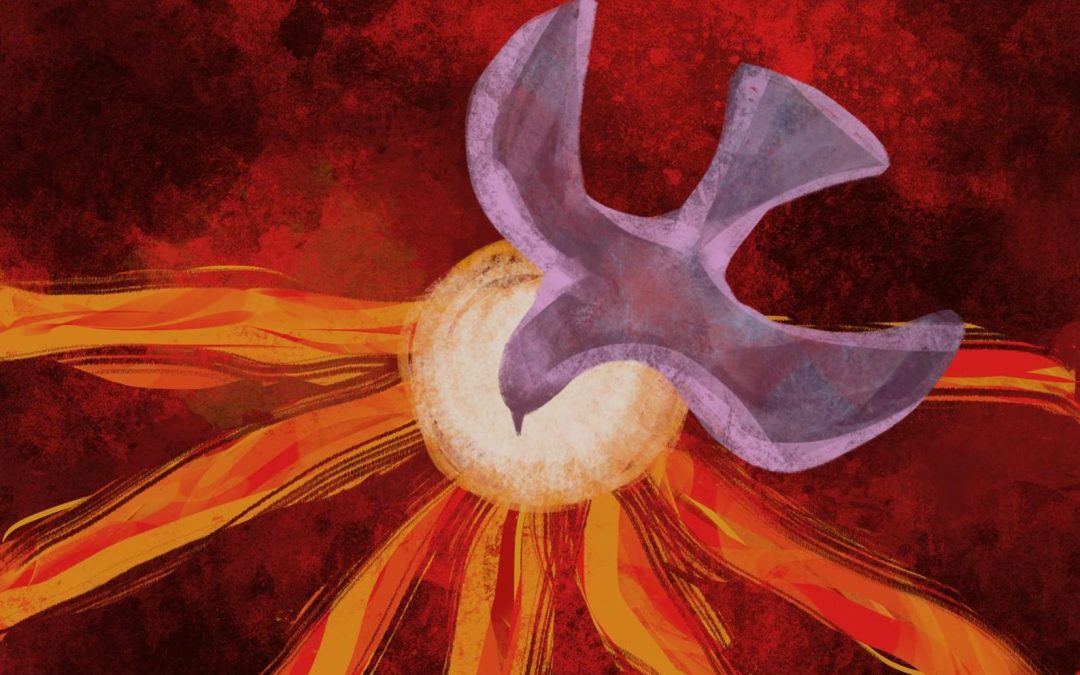
The Neglected Stepchild
by Rev. Dr. Dale Azevedo, Sr. Minister
Stories have abounded for ages (Cinderella, anyone?) about children who have been neglected by their stepparents. Fortunately, recent research at East Carolina University (ECU) has shown that this fairy-tale trope isn’t particularly accurate.1 Sadly though, ECU’s research comes a little too late for poor old Pentecost.
You’ve heard of Pentecost, haven’t you? The oft-neglected stepsibling of Christmas and Easter? You wouldn’t know it by strolling through the department store aisles or listening to the radio or television, but Pentecost, along with Christmas and Easter, is one of the three holiest seasons in the Christian year. You’d never imagine going a year without Christmas, would you? Or skipping the celebration of Easter? But when was the last time you sent someone a Pentecost card? Or hid a basket of gifts for the kids on Pentecost? Not only that, but Christmas gets 12 DAYS to celebrate it. And Easter gets 7 WEEKS! But poor old Pentecost only gets one day, one day that we often forget because this time of year is just too busy.
Do you even know when Pentecost is celebrated this year? Or what it commemorates?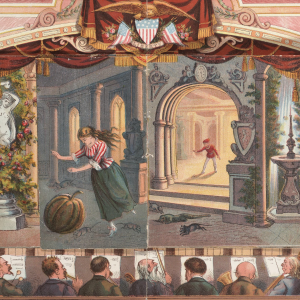
Sadly, while Christmas and Easter get to go to the “Hallmark” ball, shunned little Pentecost gets stuck sitting at home cleaning out the fireplace.
So, this year we are throwing a ball just for Pentecost!
This year, Pentecost falls on Sunday, May 19. Yes, that’s THIS Sunday! And, of course, we have other plans set for worship. This Sunday is Jubilation Sunday, the celebration of the end of our church school year. It is a big day for our church and a chance to celebrate our children, their growing faith, their leadership, and all the hard work of our church school volunteers and staff. So, once again, Pentecost was relegated and set aside on a busy day.
That’s why I have decided to declare Sunday, May 26, as Pentecost: Part Deux! On that Sunday, we are going to give Pentecost all the accolades and appreciation it is due. All of our hymns…Pentecost. All of our prayers…Pentecost. All of our readings…Pentecost. And our sermon…you guessed it…Pentecost!
So, to get ready to show Pentecost the appreciation it deserves, I’m going to share with you a little bit about this oft-neglected beauty.
1. 50th Day – That what Pentecost means. It means the 50th day following Passover. It comes from the Jewish tradition of the Feast of Weeks (i.e. a week of weeks, or 49 days, following Passover). The end of the Feast of weeks was called Pentecost. As you see below, something special happened on the 50th day after Passover on the year Jesus was killed.
 2. Red – The liturgical color of Pentecost is Red. It is relatively unique for this day. Some traditions will also use red on Palm Sunday and others on Good Friday, but all churches that follow the liturgical calendar use red on Pentecost. All other high holy days use white. While some others seasons commonly use green purple or blue, red is held back for Pentecost (except as noted above). Other symbols used on Pentecost are a flame or a dove. Both symbolize the Holy Spirit (see below!).
2. Red – The liturgical color of Pentecost is Red. It is relatively unique for this day. Some traditions will also use red on Palm Sunday and others on Good Friday, but all churches that follow the liturgical calendar use red on Pentecost. All other high holy days use white. While some others seasons commonly use green purple or blue, red is held back for Pentecost (except as noted above). Other symbols used on Pentecost are a flame or a dove. Both symbolize the Holy Spirit (see below!).
3. Holy Spirit – Pentecost is a celebration of the Holy Spirit. It was on Pentecost that the Holy Spirit descended upon, and overwhelmed, the disciples and everyone else who had gathered in Jerusalem for the Feast of Weeks in the year of Jesus death. You will hear this story when you come to church on May 26th!
4. Happy Birthday – Pentecost is treated as the birthday of the church. It was the giving of the Holy Spirit to the disciples and followers of Jesus that we recognize as the beginning of the church. This is when the mantle of sharing the faith passed from Jesus to his followers.
So, there you have it. Pentecost in a nutshell. Now you can come to church on May 26th, ready to party and let Pentecost know how beloved it is!
See you then!
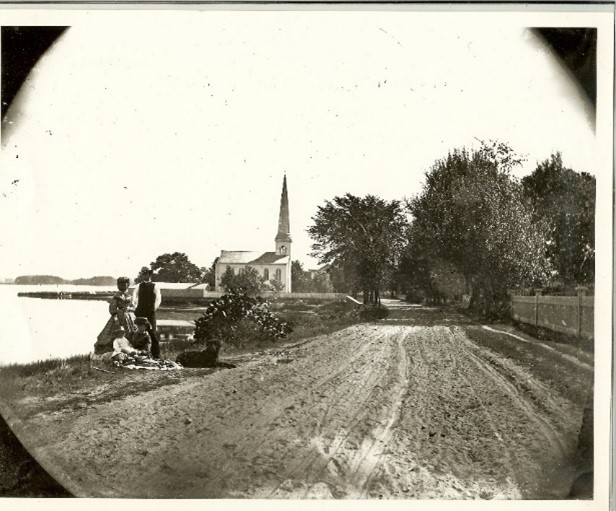
A Spirit of Change
by Rev. Racquel Ray
Associate Minister of Congregational Life
Are you the type of person who has kept their living room arranged the same way for decades? Or are you the type of person who rearranges and rotates regularly to keep things fresh?
This week, I’m reminded of Paul’s letter to Timothy, “God did not give us a spirit of cowardice but rather a spirit of power and of love and of self-discipline.” In some versions, the spirit of cowardice is translated as a spirit of fear. As we live into this post-pandemic, election, and church restructure year, I have heard rumblings of an undercurrent of fear. I even have some of my own!
Fear often prevents us from taking action. Fear of the unknown often hinders our ability to change. We can become consumed with internal ‘what if’ dialogues! What if (insert new thing here) causes us to (insert fear here) and everything is (insert catastrophic result here)?!
 Often, turning to scripture or Spiritual self-help is no help either. If you just have faith the size of a mustard seed everything will be ok. If you have the faith of a child everything will be ok. If you believe in God or Jesus or your church or it’s leadership enough, everything will be ok. And sometimes, everything will be ok. And sometimes, it won’t. The problem with over Spiritualizing our situation is that we can often blame ourselves, our loved ones, our church, our church leadership, or God when things don’t turn out as we planned.
Often, turning to scripture or Spiritual self-help is no help either. If you just have faith the size of a mustard seed everything will be ok. If you have the faith of a child everything will be ok. If you believe in God or Jesus or your church or it’s leadership enough, everything will be ok. And sometimes, everything will be ok. And sometimes, it won’t. The problem with over Spiritualizing our situation is that we can often blame ourselves, our loved ones, our church, our church leadership, or God when things don’t turn out as we planned.
So, how do we live into change? And in a church context, how do we live into change in the face of fear and in a Spiritual way? Our Quaker siblings have a wisdom to share in this area; we could pray and then wait for the answer. How can we apply this principle in our current changing context?
 We can read the rest of Paul’s letter to Timothy, “I am grateful to God—whom I worship with a clear conscience, as my ancestors did—when I remember you constantly in my prayers night and day…I am reminded of your sincere faith, a faith that lived first in your grandmother Lois and your mother Eunice and now, I am sure, lives in you. For this reason, I remind you to rekindle the gift of God that is within you through the laying on of my hands, for God did not give us a Spirit of fear…”
We can read the rest of Paul’s letter to Timothy, “I am grateful to God—whom I worship with a clear conscience, as my ancestors did—when I remember you constantly in my prayers night and day…I am reminded of your sincere faith, a faith that lived first in your grandmother Lois and your mother Eunice and now, I am sure, lives in you. For this reason, I remind you to rekindle the gift of God that is within you through the laying on of my hands, for God did not give us a Spirit of fear…”
Beloved, this church has seen its share of change. In a few hundred years, this church has weathered many storms. It has been broken and flooded. It has been divided and rebuilt. But, I have no doubt that the Spirit of God that resides in this congregation and in each of you empowers us with a boldness that can only be from God. This Spirit is witnessed in your ministry and in your ‘spirit of power and of love and of self-discipline.’
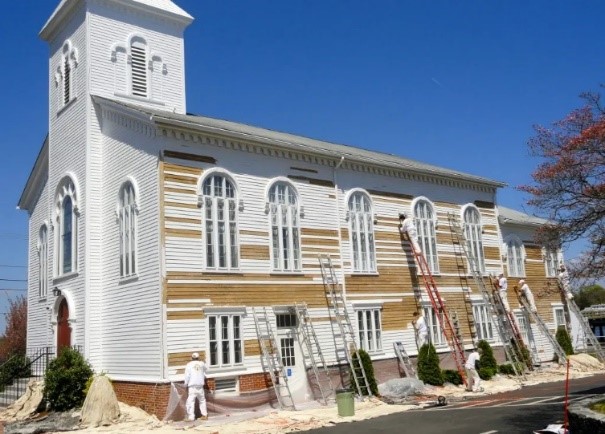 Each visitor that is embraced, each child that is nurtured, each elder that is supported, and each minister that is raised here has witnessed your spirit of power, love, and self-discipline!
Each visitor that is embraced, each child that is nurtured, each elder that is supported, and each minister that is raised here has witnessed your spirit of power, love, and self-discipline!
As we grow into the new structure – and with it some challenging conversations and difficult decisions – let us remember that we do not need to come to these moments with a spirit of fear. We can work through our changes, pray through our changes, and wait through our changes as our ancestors have done. We too can approach these conversations and decisions with the Spirit of power which equips us to embrace the prophetic and bravely transition into the unknown future. We can move forward with a Spirit of love that opens our egos and our humility to make space for being wrong. We can hold our opinions and sometimes our tongues allowing self-discipline to pull us back from saying hurtful or harmful things.
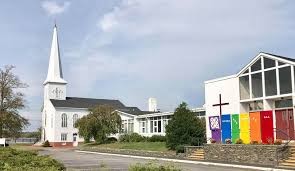 Change can be hard. And the church is changing. Therefore, sometimes church can be hard. Do we leave? Do we quit? Do we freeze from fear? Or, do we prayerfully, powerfully, and prophetically move forward in love and leave behind our fear? Let us ‘rekindle the gift of God that is within you’ – that same faith that lives in you, in your parents, and in your grandparents – and in the ancestors of this church – and traverse these changes together.
Change can be hard. And the church is changing. Therefore, sometimes church can be hard. Do we leave? Do we quit? Do we freeze from fear? Or, do we prayerfully, powerfully, and prophetically move forward in love and leave behind our fear? Let us ‘rekindle the gift of God that is within you’ – that same faith that lives in you, in your parents, and in your grandparents – and in the ancestors of this church – and traverse these changes together.
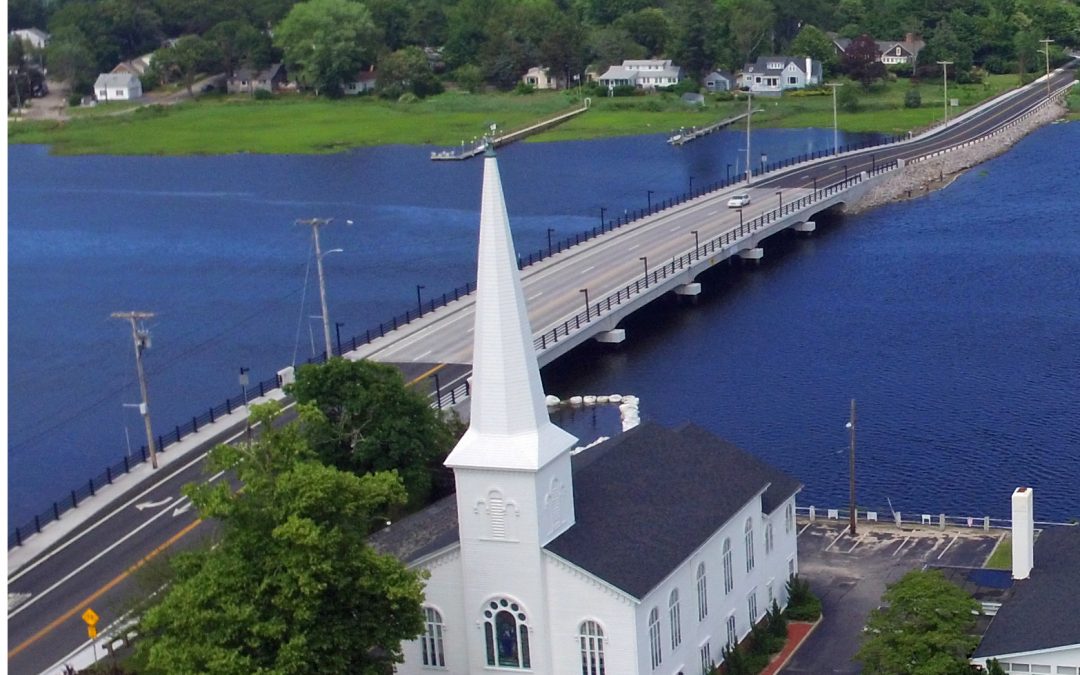
Why do you come to church?
by Rev. Dr. Dale Azevedo, Sr. Minister
Those of you who have been attending worship at BCCUCC since before the pandemic may remember the Sunday when I asked everyone to get up and change seats. That morning, I divided the pews into four sections and labeled each section according to a part of our mission Statement. The sections were divided as follows:
South: Worships God
South-central: Cares for One Another
North-central: Works for Justice and Peace (this was combined with Welcomes All)
North: Renders Loving Service
I asked everyone to get up and sit themselves in the section that best represented the main reason they chose to participate in BCCUCC.
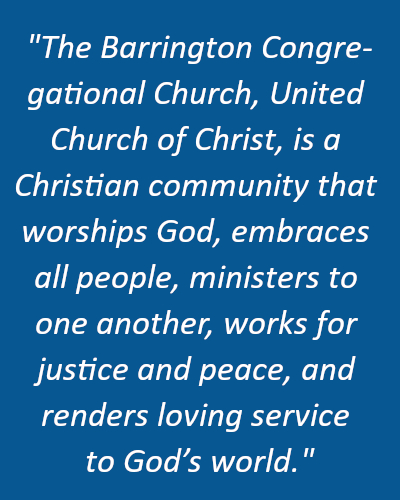 What surprised us all was that all four sections ended up roughly equal in occupants. No one expected such a well-rounded representation of our mission statement among our members.
What surprised us all was that all four sections ended up roughly equal in occupants. No one expected such a well-rounded representation of our mission statement among our members.
Some of us attend BCCUCC to worship.
Some of us attend to be a part of a community.
Some of us attend to witness for social justice.
Some of us attend to help others in need.
And all of us do this as a part of our relationship with, and commitment to, God.
So, I ask you, “Why do you participate in BCCUCC?” If you had to answer that question for yourself, and place yourself in one of those four categories, which one would you choose? And…once you know that, how are you living out that reason? What are you doing to live into that focus of your calling? Would you feel more fulfilled or would your relationship with church be more meaningful if you were doing more? Or something different than you currently are?
When we adopted our new church structure, we also divided our ministries into these categories; not just the four I used years ago, but six (five from our mission statement plus faith formation). And we have numerous teams each focused on a particular ministry belonging to one of these categories. For example, under faith formation we have teams that 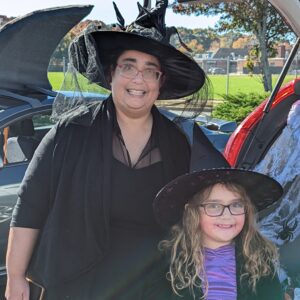 focus on church school, adult education, the nursery, and confirmation (among others). The idea in this new format is to provide people easy entry into a small, focused ministry that they are interested in. If you want to focus on worship, join one of our worship teams. If you want to focus on helping those in need, join one of our service teams. The choices are endless. (This is literally true because if we don’t have a team for you already, you can always start a new one!)
focus on church school, adult education, the nursery, and confirmation (among others). The idea in this new format is to provide people easy entry into a small, focused ministry that they are interested in. If you want to focus on worship, join one of our worship teams. If you want to focus on helping those in need, join one of our service teams. The choices are endless. (This is literally true because if we don’t have a team for you already, you can always start a new one!)
“But, Dale,” you ask, “how do I know what teams already exist? And how do I get involved?”
Well, I’m glad you asked! All our ministry teams are now listed on the website by category along with contact information for the team leader. You can simply reach out to the team leader and share your interest. Or, if that is a little intimidating, you can also reach out to Racquel or me and ask for help. We will gladly introduce you to someone who can help bring you along.
While we’re talking about this, I should also say a little something about our support teams. Support teams are those  teams that do not fit directly into our mission statement but are essential to running our church and therefore are the foundation our primary ministry teams need to be successful. These teams are focused on property, finance, and administration. These teams are great for people who like doing, who like working behind the scenes, and who often have special skills like understanding numbers, working on physical projects, or helping with human resources. Not all these teams require these special skills, many just require a willingness to be a part of a decision-making process. But they sometimes appeal to a type of person who may feel called to get involved in a way different from one of our primary teams. If this is you, you are needed too!!
teams that do not fit directly into our mission statement but are essential to running our church and therefore are the foundation our primary ministry teams need to be successful. These teams are focused on property, finance, and administration. These teams are great for people who like doing, who like working behind the scenes, and who often have special skills like understanding numbers, working on physical projects, or helping with human resources. Not all these teams require these special skills, many just require a willingness to be a part of a decision-making process. But they sometimes appeal to a type of person who may feel called to get involved in a way different from one of our primary teams. If this is you, you are needed too!!
So, take a moment and think about why you have chosen to be a part of our church community. And then explore our ministry team list and see if there is a ministry you are interested in being a part of. It can make your participation in BCCUCC even more rewarding!!

Earth Day
by Rev. Racquel Ray
Associate Minister of Congregational Life
In the days of Noah, God promised, “I will never again curse the ground because of humankind…as long as the earth endures, seedtime and harvest, cold and heat, summer and winter, day and night, shall not cease.” (Genesis 8:21-22). However, changes are happening to the earth which do threaten human flourishing. Ice caps are melting, oceans are warming, wildlife is changing, and natural disasters all effect how we live. What are your thoughts on climate change and humanity’s impact on the climate? How does climate impact humanity?
Earth Day is April 22nd. Originally celebrated in 1970, Earth Day is now an annual event celebrating, observing, and motivating environmental justice. By extension, some have dedicated April as Earth Month or Creation Care Month. How we observe Creation Care Month can be a reflection of our personal theology around stewardship of the planet. For some, creation stewardship draws them to Climate Change rallies on the statehouse lawn. For some, creation stewardship means shopping small and local or using refillable beverage containers. What can you do to be a good creation care steward?
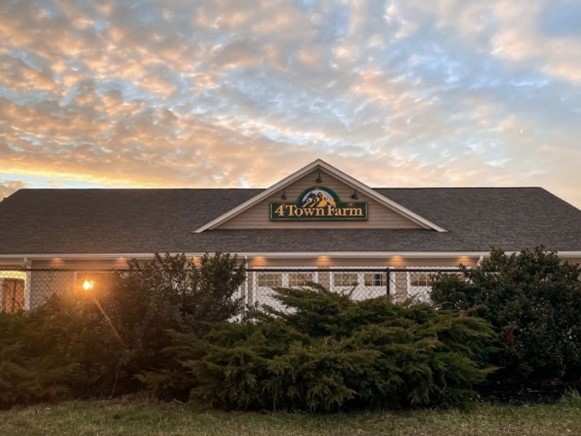 When my oldest children were small, our family had a goal of reducing our carbon footprint. We lived in a walkable city with a local food co-op, weekly farmer’s market, and several parks and museums with outdoor green space. The power bill was offset with clean energy generated through hydro-electric credits. We could shop locally and bring reusable totes and refillable containers to the co-op. We could use environmentally safe soap and detergent and add ‘grey’ water (from bath, dishes, or laundry) to the arid soil to keep the garden watered and pest free. We challenged the kids to conservation contests by seeing who could use the least water in a shower – closing the drain and measuring how many inches of water were left in the tub.
When my oldest children were small, our family had a goal of reducing our carbon footprint. We lived in a walkable city with a local food co-op, weekly farmer’s market, and several parks and museums with outdoor green space. The power bill was offset with clean energy generated through hydro-electric credits. We could shop locally and bring reusable totes and refillable containers to the co-op. We could use environmentally safe soap and detergent and add ‘grey’ water (from bath, dishes, or laundry) to the arid soil to keep the garden watered and pest free. We challenged the kids to conservation contests by seeing who could use the least water in a shower – closing the drain and measuring how many inches of water were left in the tub.
Barrington has many ‘green’ attributes. We have the East Bay Bike Path, the Barrington Farm School, Land Conservation Trust green spaces, the town beach, and several parks and playgrounds all open to the public. The local food and farm to table food systems are growing. Recycling and composting are becoming more common. We’re adding sidewalks and small businesses. And our local farms and markets provide a decent variety of local, in season produce and locally made products. What are some of your favorite local ‘green’ spots?
 Our family has settled and put down roots, figuratively and actually, by creating Ray Farm. Our yard is a wholistic suburban yard farm which provides year-round organically grown food for our family. We are a National Wildlife Federation certified habitat. We grow blueberries, blackberries, black raspberries, golden raspberries, cherries, pears, apples, kale, carrots, asparagus, rhubarb, cucumbers, green beans, tomatoes, potatoes, peppers, and herbs. We added solar panels in 2023 and upgraded to electric heat as well. We have not been able to eliminate our carbon footprint – but we sure have reduced it! How do you reduce your carbon footprint?
Our family has settled and put down roots, figuratively and actually, by creating Ray Farm. Our yard is a wholistic suburban yard farm which provides year-round organically grown food for our family. We are a National Wildlife Federation certified habitat. We grow blueberries, blackberries, black raspberries, golden raspberries, cherries, pears, apples, kale, carrots, asparagus, rhubarb, cucumbers, green beans, tomatoes, potatoes, peppers, and herbs. We added solar panels in 2023 and upgraded to electric heat as well. We have not been able to eliminate our carbon footprint – but we sure have reduced it! How do you reduce your carbon footprint?
Whether you plow under your lawn to grow food, recycle your discarded clothes and fabrics in the collection shed in the church parking lot, add solar power to your home, turn off the water while brushing your teeth, upgrade to efficient appliances, or simply refill your reusable water bottle you can make a difference. Each of us are created to ‘tend and to till’ this earth – as God instructed humanity through Adam and Eve. What’s your ‘green’ practice?
This month, chose one thing you can do to make a difference. Will you drive less? Turn off lights in empty rooms? Hang your laundry to dry outside? Have Meatless Meal Monday? Shop locally? Support a local farm? Learn about composting? Plant a garden? Reduce the amount of plastic you use? Plant a tree?
 Come celebrate Creation Care Sunday on April 21st and bring your own mug (or use one of ours) for coffee hour. Also, bring your own Creation Care ideas to share during the worship service and during the fellowship time afterwards at coffee (which is always fair trade and equal exchange). Let’s grow green together!
Come celebrate Creation Care Sunday on April 21st and bring your own mug (or use one of ours) for coffee hour. Also, bring your own Creation Care ideas to share during the worship service and during the fellowship time afterwards at coffee (which is always fair trade and equal exchange). Let’s grow green together!
- Barrington Land Conservation Trust, Clean-up Allin’s Cove Conservation Area. Sunday, April 21, from 1 to 3 pm to help us clean up litter as well as debris that has washed ashore over the winter. All ages are welcome with parental supervision. https://www.blct.org/earth-day-eve-cleanup-at-allins-cove/
- Eastern Rhode Island Conservation District Earth Month events include seedling sales, plogging (picking up litter while jogging), and rain barrel workshops https://www.easternriconservation.org/earthmonth
- Four Town Farm opening mid-April https://4townfarm.com/
- Plant City X opening soon in Barrington Center https://plantcityx.com/
- Prickly Ed’s Cactus Patch Native Plant Emporium, Reopening “Earth Week” April 2024! https://pricklyeds.com/

What is your favorite hymn?
by Rev. Dr. Dale Azevedo, Sr. Minister
If the stories I was told in seminary were true, then in the late 1980’s the United Methodist Church conducted a survey of its membership to determine which hymn in its new hymnal was the most beloved and which was the most disliked. The results of this survey were hilarious and “How Great Thou Art” was rated BOTH the most beloved and the most disliked. Apparently, because so many people liked the hymn it was often sung at funerals. And because it was so often sung at funerals, other people disliked it or had negative connotations associated with it. What do you think of “How Great Thou Art?” Personally, I like it!
However, I would probably not classify it as one of my favorites.
I have numerous hymns that I like. Some I like because I love the tune that they are paired with. These would be songs like “Now the Green Blade Rises” or “What Child is This?” Others, like “De colores” or “What Wondrous Love is This,” I like because of the words 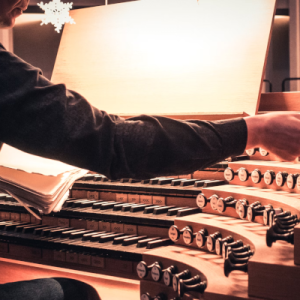 or the theology they proclaim. Still others hold a special place in my heart because they invoke fond memories or emotions from days long gone. I’m talking about you, “Old Rugged Cross” and “Here I Am, Lord.”
or the theology they proclaim. Still others hold a special place in my heart because they invoke fond memories or emotions from days long gone. I’m talking about you, “Old Rugged Cross” and “Here I Am, Lord.”
What about you? What hymns do you like? What hymns make you smile, or cause you to tear up? What hymns transport you to another time or place? What hymn do you wish we sang more often, and why?
We have a special opportunity coming up to explore these questions and hear the answers from one another. As many of you may recall, Racquel tore up her knee quite badly last summer. Surgery wasn’t needed immediately, but it was recommended once her leg had some time to heal from the initial trauma. That surgery has been scheduled for April 4th, the Thursday after Easter. As it turns out, Racquel was scheduled to preach on April 7th. When we realized this, we decided that alternate plans needed to be made. So, we are planning a new experience:
We’re going to have a hymn sing!
 But this is not going to be just like any other hymn sing. We are going to sing your favorites and learn why they mean so much to you!
But this is not going to be just like any other hymn sing. We are going to sing your favorites and learn why they mean so much to you!
Between now and April 7th, I am inviting everyone who wants to, to pick out one of your favorite hymns that you would like to share that Sunday. You will be given the choice to announce which hymn you have chosen and share briefly about why it is so meaningful to you. As you see from what I shared above, there can be any number of reasons why that hymn may be so meaningful. Your reason doesn’t need to be revolutionary or entirely profound. It means something to you, and that is good enough for us. Maybe your grandmother used to sing it to you, or maybe it was played at your wedding, or maybe it spoke to you at a turning point in your life. Who knows? But I invite you to share your story and your hymn with us on the 7th. Then, after you share, we will sing your hymn together as a congregation.
So, do you have a favorite hymn, or one of many favorites? Is there a hymn that holds special meaning in your faith, family, or past? If so, let me know. Not everyone needs to reserve their spot ahead of time, but if you want to make sure you get a chance to share, send me an email or call me up and I’ll make sure we save time for you.
In the meantime, keep on singing!
Oh, and if you like or despise “How Great Thou Art,” that’s okay. Apparently, you aren’t alone!


